Your Eminence Metropolitan Stephanos of Tallinn and All Estonia,
Venerable Hierarchs,
Distinguished clergy, delegates, and guests,
What a blessing and joy it is for all of us to participate in this celebration of the Divine Liturgy as a fellowship of Orthodox brothers and sisters during the General Assembly of the Conference of European Churches, where once again we are invited to demonstrate our firm presence and declare our fervent witness.
Like the myrrh-bearing women of the Gospel reading for Orthros today, we too bear and bring the oil to the tomb, on the first day of the week, and behold the angel announcing the resurrection of the Lord from the dead (Mk 16. 1–8). And as we hear the Lord Himself addressing His disciples in the evangelical reading of this morning’s Liturgy, we too are called to follow Him, “preaching the gospel of the kingdom and healing every disease and infirmity among the people” (Mt 4. 23). Indeed, in the epistle reading, we are also reminded that “it is not the hearers . . . but the doers of the law who are righteous before God” (Rom. 2. 13).
For over a century now, the Ecumenical Patriarchate has advocated for ecumenical relations with other Christian communions and confessions. And from the middle of the twentieth century, the Orthodox Church has advanced ecumenical dialogue through the World Council of Churches and, subsequently, the Conference of European Churches. Indeed, you will recall that the Encyclical and the Message of the Holy and Great Council of 2016 underlined the importance of “witness in dialogue” (in Paragraphs 20 and 3). A dialogue which is actually not limited to the inter-Christian sphere, but goes beyond that, to the interfaith level, where the Ecumenical Patriarchate has pioneered academic discussions with the other two Monotheistic religions, Judaism and Islam, in a spirit of mutual respect and peaceful coexistence.
For this reason, we cannot but express our deep sorrow and our repulsion for the recent deplorable incident of the tearing apart of a copy of the Quran at a mosque in the city of Xanthi, in Greece’s Western Thrace. This barbaric act of vandalism of the sacred book of Islam is not directed only against the Muslim faithful, but it is primarily a clear attack against religious faith in general, a serious issue of concern for all of us. The Church of Constantinople gives a constant testimony to the necessity of the protection and promotion of religious freedom and of free exercise of worship, championing the ethos of solidarity toward the other faith communities.
In the same spirit, in the context of the ecumenical field, the special decision of the Council in Crete that discussed “Relations of the Orthodox Church with the Rest of the Christian World” underlined “the central place of the Orthodox Church in the matter of the promotion of Christian unity” (in Paragraph 1), adding that:
The contemporary bilateral theological dialogues of the Orthodox Church and her participation in the Ecumenical Movement rest on this self-consciousness of Orthodoxy and her ecumenical spirit, with the aim of seeking the unity of all Christians on the basis of the truth of the faith and tradition of the ancient Church of the Seven Ecumenical Councils. (In Paragraph 5)
Dear friends,
This means that, in our minds as in our hearts, the theme of our general assembly in this beautiful city is not a mystery for us as Orthodox Christians. Being “under God’s blessing” and “shaping the future” essentially and fundamentally imply following the commandment and prayer of Christ “that His disciples may be one” (Jn 17. 21).
In addressing the unprecedented challenges that face our world in the present and in the future, we cannot remain either indifferent or in isolation. We cannot avoid meeting and serving our neighbor, “the least of our brothers” and sisters (Mt 25. 40), in whom we discern and respond to Christ Himself. And of course, this inevitably and undeniably means first and foremost working together as Orthodox Christians.
After all, how can we possibly witness to unity in dialogue when we are ourselves fragmented, when we ourselves are not in dialogue, or—worst of all—when we are ourselves at war with our own brothers and sisters. Otherwise, we will surely hear the condemnation of our Lord as He addresses hypocrites: “Why do you see the speck in your neighbor’s eye, but do not notice the log in your own eye?” (Lk 6. 41). But lest we assume that this means we should abandon our efforts toward Christian unity, we should underline that it actually implies we should intensify and fortify our efforts toward visible and tangible Orthodox unity. At the very least, it requires not slandering or wounding one another.
These are the paternal reflections which we would like to share with you this morning. “Let us depart in peace!” Let us go forward in peace with one another, in peace with our brothers and sisters, and in peace with all of God’s creation.
Amen.
































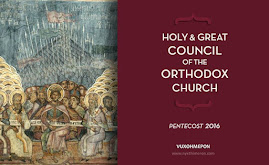
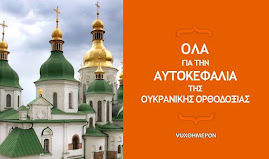
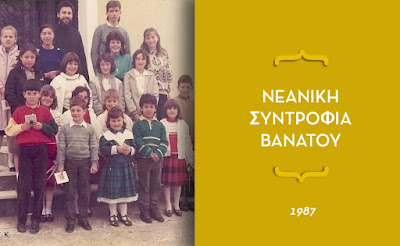
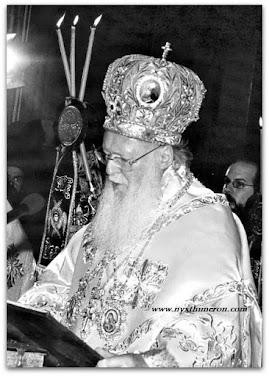





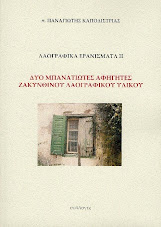
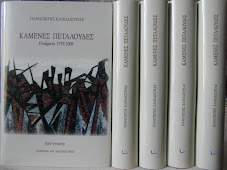

Δεν υπάρχουν σχόλια:
Δημοσίευση σχολίου